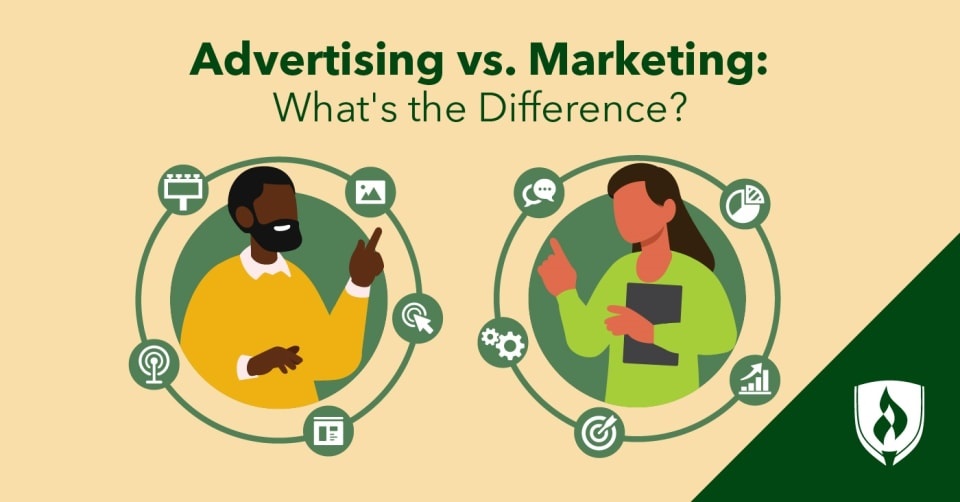
Winning prestigious advertising awards. Launching marketing campaigns that blow away the competition. If you’re a creative (and competitive) type, chances are you’ve considered what it’s like to live the fast-paced life of an advertising or marketing professional.
The truth of the matter is that either of these career routes could potentially be a great fit for you. While these fields certainly share some significant overlap, there are key distinctions between advertising versus marketing that you’ll want to understand before exploring potential career paths. Keep reading for a better big-picture understanding of how these fields fit together—and how they differ.
Advertising vs. marketing: How they fit together
People often use the words marketing and advertising interchangeably, but there is a difference. Marketing is an overarching field of study that includes advertising activities under its umbrella, so to speak.
Marketing is the whole process of determining product, placement, promotion and pricing. Advertising covers the promotion part of this process.
What is marketing?
Marketing is all about finding the potential value of a product or offering and determining the best way to inform the public of this offering’s value. As a marketer, you could be involved in any of these stages of the marketing cycle, commonly known as the four Ps of marketing:1
- Product: This step can include anything from product design to determining whether there is a want or need for such a product in the marketplace.
- Placement: Once you have your product, determine the best way to get it in front of the consumer; retail, online, event marketing or any of several other strategies play into this.
- Promotion: Here’s where advertising comes in, but even here, it’s only part of the picture. In addition to advertising, a promotional campaign can also include public relations, events, sponsorships and more.
- Pricing: Determining the optimal price to maximize sales is essential to the marketing process. You don’t want to price too low and miss revenue but not so high that it chases away customers.
But even after the sale, a marketer’s job is not done.
“Marketing is all of the steps leading up to the sale and all of the steps that come afterward,” says Christina Mackey, marketing manager at GoWrench.
What comes after the sale? Market research, for one thing. While there is plenty of preliminary market research conducted, analysis after the fact can be a gold mine of information. Exploring questions regarding what consumers like about the product, the path they took to make the purchase, where they heard about it and whether they would they buy it again can all help guide future marketing decisions.
It should be mentioned that many marketing jobs are numbers-oriented, such as forecasting budgets, sales and consumer demand.
“Marketing today is more about science and data analytics,” observes Victor Ramirez, owner of An Abstract Agency.
Common marketing job titles
Every marketing department will have a variety of expert specialists, giving you various avenues of opportunity for your career. You’ll find management job titles below, but just remember, there are also many associate or specialist job titles within a marketing department under each of these headings.
- Marketing managers are responsible for the overall planning and execution of the marketing program. These can either be generalists with a broad base of marketing knowledge or specialists within niche marketing disciplines.
- Advertising managers oversee the development and strategy related to advertising. This role is often responsible for guiding an external advertising agency’s work or managing an in-house creative staff.
- Brand managers help develop and protect brand assets such as company logos, slogans, taglines, organizational voices, style guides and more.
- Public relations managers work to build and maintain positive public perceptions of an organization. They often forge relationships with members of the media to tell the organization’s story.
- Sales managers work with the sales team to develop strategies and set goals for selling the company’s products or services.
What is advertising?
“Advertising is just one of the many tools we use to make marketing successful,” says Bob Clary, director of online engagement at Intellibright®.
Advertising is exclusively from the promotional phase of marketing, but it’s only part of a promotional strategy. Advertising is often referred to as paid media because the client totally controls the message and placement of the ads. This is different than public relations (often referred to as earned media), in which you hope to get favorable publicity through gatekeepers such as editors, news directors, bloggers or social media specialists.
The focus of advertisers is to create memorable, attention-grabbing advertisements that relay and enforce key marketing messages. These advertisements are based on a wide variety of media. Billboards, digital signs, online banner ads, bus wraps and more can relay an advertising message, and all come with subtle differences that inform advertisers’ creative approach.
Common advertising job titles
Advertising job titles will vary depending on the setting. Many advertising professionals work for agencies that serve multiple clients—and with that comes roles dedicated to managing multiple priorities. That said, there’s still a fair share of advertising professionals working on internal “in-house” advertising teams.
Here are just a few of the advertising job titles you may see in your job search:
- Account representatives work in advertising agencies and serve as a go-between for clients and the creative teams that serve them. This requires a great sense for customer service and an understanding of how to realistically accommodate client requests.
- Graphic designers and art directors are the creatives who set visual layouts, choose typography, work with photographers and do just about everything else to make advertising look attractive. These professionals work closely with copywriters to maintain a cohesive look and feel.
- Copywriters are the wordsmiths who compose headlines, body copy and everything else related to language. They are responsible for developing a voice for the client that should be maintained throughout all components of the advertising campaign.
Advertising and marketing skills
With the similarity between these fields, you’ll need a similar skill set to succeed in both. That said, when it comes to hard skills, you may find each profession has its unique requirements.
Empathy
Being able to put yourself in the customer’s shoes is key to successfully marketing or advertising a product.
By understanding your audience, you can determine what will resonate with them, where they may spot your advertisements, why they need the product and so much more.
One key to any marketing campaign is figuring out why the customer needs the product. Will it make their lives easier? Will it solve a problem for them? And how will the product make them feel? Empathy is crucial to answering all these questions.
Creativity
Creativity is another important skill for advertising and marketing. Marketers need to brainstorm innovative products and features, and advertisers need to create fresh advertising campaigns.
Chances are you pay attention to what seems fun, exciting and innovative and let the rest of the ads you see fade into the background. To grab the inundated consumer’s attention, marketers and advertisers need to flex their creative muscles and come up with new ideas.
Flexibility
The worlds of marketing and advertising are constantly changing. Whether it’s a gradual shift like the slow fade of print advertising or a flashy seasonal trend, marketers and advertisers need to keep up with the industry.
Plus, consumer wants and needs are changing as well. Millennials have different interests and tastes than baby boomers, and Generation Z has its own wants and needs different from the other generations. Beyond this, there are various demographics and other trends to track as well.
Put all this together, and today’s marketers and advertisers need to be prepared to adapt and stay flexible.
What’s the job outlook for advertising and marketing professionals?
Overall, both the advertising and marketing fields appear to be solid spaces to build a career. Check out what the Bureau of Labor Statistics has to say about projected job growth for these occupations:
Projected Employment Growth | ||
Occupation | Projected Employment Growth (2021–2031)2 | |
10% | ||
4% | ||
8% | ||
19% | ||
3% | ||
4% | ||
Advertising vs. marketing: Where do you fit?
Now that you know the answers to some of the key questions regarding advertising versus marketing, take some time to evaluate which of these jobs might be best for you. Fortunately for you, there are some tell-tale signs to look for.
Find out if you’d fit in the marketing world by checking out our article “6 Signs You Might Be Destined to Work in Marketing.”
1Alexandra Twin, “The 4 Ps of Marketing and How to Use them In Your Strategy,” Investopedia, June 24, 2022, [accessed October 2022], https://www.investopedia.com/terms/f/four-ps.asp.
2Bureau of Labor Statistics, U.S. Department of Labor, Occupational Outlook Handbook, [accessed October 2022] https://www.bls.gov/ooh/. Information represents national, averaged data for the occupations listed and includes workers at all levels of education and experience. Employment conditions in your area may vary.
Intellibright is a registered trademark of Intellibright Corporation.




